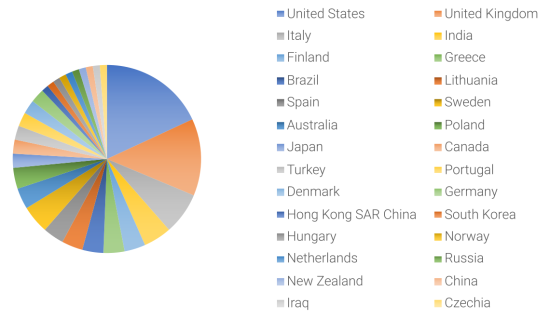Search Articles
Journal:
all
Total
—
96 articles
Review 8 May 2023
Annette Toivonen
6202 Views4760 Downloads5 Citations
Article 2 May 2023
Floros Flouros
Highlights of Sustainability
Volume 2 (2023), Issue 2, pp. 62–74
Volume 2 (2023), Issue 2, pp. 62–74
3573 Views1563 Downloads
Article 13 Apr 2023
Thomas Krabokoukis
Highlights of Sustainability
Volume 2 (2023), Issue 2, pp. 50–61
Volume 2 (2023), Issue 2, pp. 50–61
5347 Views1076 Downloads5 Citations
Article 7 Mar 2023
Olaniran Anthony Thompson, Agbotiname Lucky Imoize and Taiwo Timothy Amos
Highlights of Sustainability
Volume 2 (2023), Issue 1, pp. 35–49
Volume 2 (2023), Issue 1, pp. 35–49
3911 Views1285 Downloads3 Citations
Article 28 Feb 2023
Michele Sisto and Angela Cresta
Highlights of Sustainability
Volume 2 (2023), Issue 1, pp. 16–34
Volume 2 (2023), Issue 1, pp. 16–34
3972 Views1059 Downloads
Commentary 24 Feb 2023
Ada Rocha and Cláudia Viegas
Food service comprises the production of meals consumed outside the home, including consumers from all age groups and in different sectors, such as schools (from kindergarten to university), public and private companies, the health sector (from
Food service comprises the production of meals consumed outside the home, including consumers from all age groups and in different sectors, such as schools (from kindergarten to university), public and private companies, the health sector (from hospitals to elderly care institutions), military, sports facilities and restaurants (from fine dining to fast-food). Food service units (FSU) achieved importance and responsibility not only for feeding the population but also as an important setting for public health interventions, potentially educating consumers and modulating behaviours through the meals provided. In addition to its socioeconomic impact, the food service industry has a strong environmental impact. More sustainable food service starts with the basics: minimizing environmental impact by reducing carbon footprint. Food service industry is being encouraged to make choices that positively impact the environment. Nevertheless, most of the efforts and research made in the last years have been focused on evaluating and reducing food waste. This article focuses on strategies that could be implemented beyond food waste, and act on changing the food offer towards health and sustainability while promoting consumers’ behaviour change.
or
Access Full Article
Highlights of Sustainability
Volume 2 (2023), Issue 1, pp. 10–15
Volume 2 (2023), Issue 1, pp. 10–15
5098 Views1614 Downloads2 Citations
Short Note 10 Feb 2023
Simone Pettigrew and Leon Booth
Highlights of Sustainability
Volume 2 (2023), Issue 1, pp. 1–9
Volume 2 (2023), Issue 1, pp. 1–9
3528 Views1262 Downloads1 Citations
Article 5 Feb 2023
Murad Shoman, Hocine Imine, Kenth Johansson and Viveca Wallqvist
Highlights of Vehicles
Volume 1 (2023), Issue 1, pp. 1–16
Volume 1 (2023), Issue 1, pp. 1–16
4330 Views1260 Downloads3 Citations
Editorial 22 Dec 2022
Highlights of Sustainability Editorial Office
Highlights of Sustainability
Volume 1 (2022), Issue 4, pp. 253–254
Volume 1 (2022), Issue 4, pp. 253–254
3258 Views628 Downloads
Article 6 Dec 2022
Julia Hillmann, Anne Bergmann and Edeltraud Guenther
This paper investigates the time-dependent effects of building organizational resilience. So far, empirical research only finds evidence that organizational resilience provides benefits in the long term. For the short and medium term, the link remains unclear.
This paper investigates the time-dependent effects of building organizational resilience. So far, empirical research only finds evidence that organizational resilience provides benefits in the long term. For the short and medium term, the link remains unclear. On the one hand, literature indicates that building organizational resilience is costly. On the other hand, actions to build organizational resilience are perceived by investors, which should provide immediate positive effects for companies. This study investigates these two assumptions in the climate change context. We apply multiple regression analysis to study the relationship between resilience capabilities and different measures of financial performance. For market value and financial volatility, our findings indicate that building organizational resilience provides immediate benefits. For the total stock return index, we find only benefits that materialize with a time lag. We find no evidence at all that building resilience capabilities is related to costs in terms of lower accounting-based financial performance. Overall findings indicate that building organizational resilience is advantageous as it prepares an organization to face the challenges of climate change and, at the same time, provides financial benefits.
or
Access Full Article
Highlights of Sustainability
Volume 1 (2022), Issue 4, pp. 233–252
Volume 1 (2022), Issue 4, pp. 233–252
6654 Views3893 Downloads3 Citations

Volume 2 (2023), Issue 2, pp. 75–82